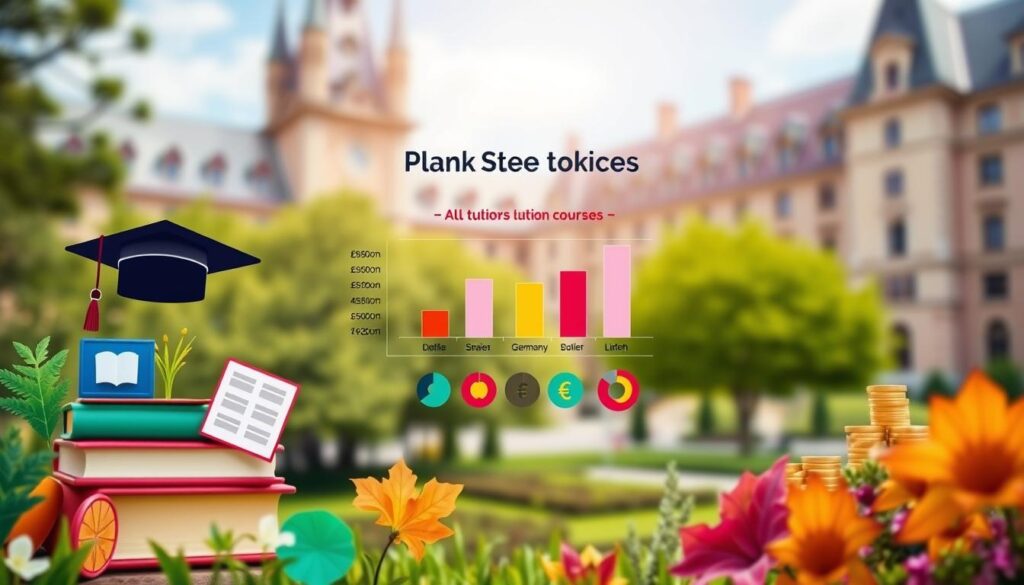Studying a Plant Science course in Germany is a great choice. Germany’s education system is top-notch, with modern research facilities. It offers a mix of theory and hands-on learning.
For students from India and elsewhere, knowing about tuition fees, requirements, and scholarship options is key. This article helps you understand what to expect when applying for a Plant Science course in Germany.
Key Takeaways
- Germany offers a range of Plant Science courses with varying tuition fees.
- Admission requirements typically include academic qualifications and language proficiency.
- Scholarship opportunities are available to support international students.
- Research facilities in Germany are among the best in the world.
- Students can expect a unique blend of theoretical and practical knowledge.
Understanding Plant Science as a Field of Study
Plant Science combines biology, ecology, genetics, and biotechnology. It helps us understand how plants grow and develop. This mix of subjects gives students a deep understanding of plant biology and its uses.
Definition and Scope of Plant Science
Plant Science covers many areas, like plant physiology, genetics, ecology, and biotechnology. It’s a broad field that helps us learn about plant growth and how they react to their environment. It also helps improve crop yields and supports sustainable farming.
Career Opportunities After Studying Plant Science
Plant Science graduates have many career paths to choose from. They can work in research, agriculture, or environmental conservation. Some jobs include:
- Plant Breeder
- Agricultural Scientist
- Conservation Biologist
- Biotechnologist
For more details on Plant Science courses in Germany, visit Kadamb Overseas.
Why Germany Excels in Plant Science Education
Germany is known for its excellent education and research facilities. It’s a top choice for studying Plant Science. German universities offer a variety of programs, from undergraduate to doctoral levels, with chances for specialization and research.
Germany’s focus on research gives students practical experience. They get to see the newest developments in Plant Science.
Overview of Plant Science Education in Germany
Plant science education in Germany puts a big focus on research and real-world use. The country’s universities are highly respected worldwide. They offer many programs in plant sciences.
The German Higher Education System
The German higher education system is varied. It includes universities, universities of applied sciences, and other specialized places. Universities in Germany are all about research. Universities of applied sciences, on the other hand, focus on practical skills.
Reputation of German Universities in Plant Sciences
German universities are well-known for their plant science programs. They offer both undergraduate and graduate studies. These programs work closely with industry, preparing students for the job market.
Differences Between Universities and Universities of Applied Sciences
Universities and universities of applied sciences have different focuses. Universities concentrate on theory and research. Universities of applied sciences, by contrast, focus on practical skills and real-world applications. Students should think about their career goals when deciding which to choose.
Top Universities for Plant Science Courses in Germany
Germany is famous for its top-notch education, and Plant Science is no exception. Many top universities offer great programmes. They are known for their excellent teaching, modern research facilities, and strong ties with industry.
Public Universities with Plant Science Programmes
Public universities in Germany are a hit with international students. They are affordable and have high standards. For example, the University of Hohenheim is known for its strong focus on agricultural and natural sciences.
Specialised Agricultural Universities
Germany has universities that specialise in agricultural sciences, including Plant Science. The University of Kassel is one such place. It offers programmes for both undergrads and grads in the agricultural and plant science fields.
Research Institutes with Academic Affiliations
Some research institutes in Germany work closely with universities. The Max Planck Institute is a great example. It offers students a chance to work on advanced research projects in Plant Science.
Rankings and Reputation
German universities are well-respected in Plant Science globally. They rank high in agricultural and biological sciences. The QS World University Rankings show several German universities in the top 100 for these subjects.
Types of Plant Science Courses Available in Germany
Germany has a wide range of Plant Science courses. These courses meet different academic and career goals. Universities and research places offer many programmes. They help students get the knowledge and skills needed in Plant Science.
Bachelor’s Programmes in Plant Science
Bachelor’s programmes in Plant Science give a solid start in plant biology, genetics, and ecology. These three-year courses give a broad education. It prepares students for many careers or further study.
Master’s Programmes in Plant Science
Master’s programmes in Plant Science are for those wanting more advanced knowledge. They last two years and include coursework, research, and a thesis. They’re great for boosting career chances or for research careers.
Doctoral Studies in Plant Science
Doctoral studies in Plant Science are for deep research. They let students work on original research with expert academics. These programmes lead to careers in academia or senior research roles.
Short-term Courses and Certificate Programmes
Germany’s universities also offer short-term courses and certificate programmes in Plant Science. These are good for professionals wanting to improve their skills or learn something new. They don’t require a full degree.
Curriculum and Specialisations in Plant Science
Studying Plant Science in Germany means diving into a detailed curriculum. It covers all aspects of plant sciences, readying students for many careers. The courses mix theory with practical experience, giving a full education.
Core Subjects in Plant Science Programmes
Core subjects include plant anatomy, physiology, genetics, and ecology. These courses give a wide view of plant biology. They show how plants are used in farming, gardening, and protecting the environment.
Specialisation Options in German Universities
German universities let students pick specialisations in Plant Science. Options range from plant breeding to ethnobotany. This way, students can focus on what they want to do or study.
Laboratory and Field Work Components
Lab and field work are big parts of Plant Science studies. Students do experiments, research, and field studies. These activities help them understand theory and improve their skills.
Industry-Relevant Skills Development
These programmes aim to teach skills needed in the industry. Students learn data analysis, research methods, and solving problems. For more on Plant Science courses, check out Kadamb Overseas. They offer details on studying Plant Science abroad.
Language Requirements for Plant Science Courses
To do well in Plant Science studies in Germany, you must meet the language needs of your course. Germany has many Plant Science courses. Some are in German, and others in English, for both local and international students.
German-taught Programmes and Language Prerequisites
For German-taught Plant Science courses, you need to be good at German. Most universities ask for a language level of at least B1 or B2. Some might want you to show your skills with tests like TestDaF or DSH.
English-taught Programmes and Language Prerequisites
Many German universities teach Plant Science in English, mainly for international students. For these, you need to be good at English. You might need to show your English skills with tests like TOEFL or IELTS. Usually, a TOEFL score of 80 or an IELTS score of 6.0 is needed.
Language Preparation Courses and Resources
If you don’t meet the language needs, many German universities offer language courses. These courses help you get better at the language and prepare for tests. You can also use online courses and language apps. A German university official said, “Language preparation is key to succeeding in our programmes.”
Knowing and meeting the language needs is very important for international students going to Germany for Plant Science. By doing this, students can easily start their programme and enjoy their time in Germany.

Academic Requirements for Plant Science Course in Germany
Germany’s Plant Science programmes have specific needs for students. Knowing these is key for a good application.
Qualifications Needed for Bachelor’s Programmes
To get into a Plant Science bachelor’s programme, you need a higher secondary school certificate. The exact subjects and grades vary by university.
Qualifications Needed for Master’s Programmes
For master’s programmes, you need a bachelor’s degree in a related field. This could be biology, agriculture, or environmental science.
Additional Requirements for International Students from India
International students from India must get their qualifications checked by German authorities. This includes making sure their degrees are recognized.
Recognition of Indian Degrees and Certificates
The recognition process checks if your degree is real and meets German standards. This is done through the Central Office for Foreign Education or similar bodies.
| Programme Level | Typical Qualifications Required |
|---|---|
| Bachelor’s | Higher Secondary School Certificate or Equivalent |
| Master’s | Relevant Bachelor’s Degree |
A German education expert says, “Meeting specific academic needs and getting your qualifications recognized is key for success.”
“The recognition of foreign qualifications is a critical step for international students. It ensures that their degrees are on par with German standards.”
Plant Science Course in Germany Tuition Fees, Requirements, Scholarship
Indian students looking at Plant Science courses in Germany should think about tuition fees and scholarships. Germany is famous for its top-notch education, and Plant Science is no different. The cost of studying Plant Science in Germany can change a lot, depending on the university type.
Tuition Fee Structure at Public Universities
Public universities in Germany are cheaper than private ones. Most public universities don’t charge tuition fees for undergraduate programs. But, students must pay a semester contribution, which is between €100 to €350 per semester. This fee helps cover administrative costs and includes a semester ticket for public transport.
Tuition Fee Structure at Private Universities
Private universities charge more, with fees from €5,000 to €20,000 per year. The exact fee depends on the institution and the specific program. Even though private universities are pricier, they offer specialized courses and smaller class sizes. This can be great for students wanting a more personal education.

Semester Contribution and Other Mandatory Fees
Students at both public and private universities must also pay a semester contribution. This fee is required and covers various student services. It’s important for students to plan for this extra cost.
Comparing Costs with Other Popular Study Destinations
When thinking about studying abroad, comparing costs is key. Germany’s tuition fees, mainly at public universities, are quite low compared to places like the United States or the United Kingdom. As a recent study points out,
“Germany offers one of the most affordable higher education systems in Europe, making it an attractive destination for international students.”
In summary, while tuition fees for Plant Science courses in Germany can differ, scholarships and financial aid are available. Knowing the fee structures at public and private universities, plus extra costs like semester contributions, is essential for students to make the right choice.
Cost of Living for Indian Students in Germany
For Indian students heading to Germany, knowing the cost of living is key. Germany offers a high standard of living but needs careful budgeting. This helps manage expenses well.
Accommodation Expenses
Accommodation costs are a big part of a student’s budget. Prices vary based on where you live, like dorms, shared flats, or private homes. On average, expect to pay €200 to €500 monthly for a place to stay. Shared accommodations are cheaper and let you meet other students.
Food and Daily Expenses
Food costs can be €150 to €300 monthly, based on your eating habits. Cooking at home saves money compared to eating out. Daily spending, like shopping and fun activities, adds €100 to €200 to your bill. Plan your grocery shopping and use student discounts to cut costs.
Transportation and Health Insurance
Transport costs change based on the city and your transport pass. A monthly pass can be €60 to €90. Health insurance is a must, costing about €80 to €120 monthly.
Budgeting Tips for Indian Students
Creating a budget plan is vital. Focus on what’s important and find ways to save. Use public transport, cook at home, and grab student discounts. Remember, saving money is like earning it, even more so when abroad.
By watching your spending and making smart choices, you can have a great time in Germany without worrying about money.
Scholarship Opportunities for Plant Science Students
Indian students dreaming of studying Plant Science in Germany have many scholarship options. Germany is dedicated to helping international students through its scholarship programs.
DAAD Scholarships for International Students
The German Academic Exchange Service (DAAD) offers scholarships to international students, including those in Plant Science. DAAD scholarships help cover tuition, living costs, and more. This lets students focus on their studies without financial worries.
- Study-related scholarships for Master’s and Ph.D. programs
- Research grants for doctoral and postdoctoral research
- Short-term grants for research and study stays
University-specific Scholarships for Plant Science
German universities with Plant Science programs also offer scholarships. These can be based on merit, need, or a mix of both. For instance, the University of Hohenheim gives scholarships to top students in its Plant Science courses.
Government-funded Scholarships for Indian Students
Indian students can also get government scholarships. The Indian Council of Agricultural Research (ICAR) offers scholarships for studying agricultural sciences abroad, including Plant Science.
Research Grants and Assistantships
Plant Science students can also find research grants and assistantships. These opportunities let students work on projects while studying. They gain experience and get financial help.
Exploring these scholarships can help Indian students fund their Plant Science studies in Germany.
Application Timeline and Planning
The journey to study Plant Science in Germany starts early. Preparation is key to the application process. For Indian students, knowing the application timeline is essential for a smooth start.
When to Start Preparing (12-18 Months Before)
Prospective students should prepare at least 12 to 18 months before. This time is for researching programs, preparing documents, and meeting language needs.
Key Application Deadlines Throughout the Year
Application deadlines in Germany vary by institution and program. For the winter semester, deadlines are usually from mid-May to mid-July. Summer semester deadlines are from mid-November to mid-January. Some universities have rolling admissions or multiple deadlines.
| Semester | Application Deadline Range |
|---|---|
| Winter Semester | Mid-May to Mid-July |
| Summer Semester | Mid-November to Mid-January |
Pre-departure Preparations
After acceptance, students should start pre-departure preparations. This includes health insurance, visa applications, accommodation, and learning about German culture.
Application Process for Plant Science Courses
To get into Germany’s top Plant Science programs, knowing the application process is key. It has several steps and deadlines. Prospective students need to be aware of these to apply successfully.
Application Deadlines and Important Dates
Application deadlines for Plant Science courses in Germany change by university and program. Usually, winter semester applications are due by July 15th. Summer semester applications are due by January 15th. But, always check the exact deadlines for each university, as they can vary.
Required Documents for Application
Typically, you’ll need:
- Academic transcripts and certificates
- Proof of language proficiency (German or English, depending on the program)
- Letter of motivation
- CV or resume
- Letters of recommendation
For a detailed overview of the required documents and application process, visit the university’s website or talk to educational advisors.
Application Portals and Submission Process
Most German universities use online application portals, such as Uni-Assist or their own portal. The process involves uploading documents and filling out an online form. For example, check the application process for other engineering courses in.
| University | Application Portal | Deadline |
|---|---|---|
| University of Hohenheim | Uni-Assist | July 15th |
| University of Bonn | University Portal | July 15th |
| Technical University of Munich | TUM Portal | July 15th |
Tips for a Successful Application
To boost your chances, make sure:
“All documents are submitted on time and meet the program’s specific requirements. A well-written letter of motivation and strong letters of recommendation can significantly enhance your application.”
By planning and preparing well, you can increase your chances of getting into a Plant Science program in Germany.

Student Visa Requirements for Indian Students
Indian students wanting to study Plant Science in Germany must know the visa rules. The process has several steps and documents to help you start your studies in Germany smoothly.
Types of Student Visas
Germany has various student visas, but the national visa (Type D) is key for long-term studies. This visa is valid for over three months and needed for degree courses.
Visa Application Process and Documentation
To apply for a visa, you need to submit certain documents. These include a valid passport, proof of university admission, and financial resources. You should apply at the German embassy or consulate in India.
Proof of Financial Resources
Indian students must show they can afford to live in Germany. You need about €10,332 per year. This can be shown with a blocked bank account or a scholarship letter.
Health Insurance Requirements
Health insurance is a must for all students in Germany. You need to have insurance that covers you in Germany. This can be from a German provider or an international one accepted in Germany.
| Document | Description | Requirement |
|---|---|---|
| Passport | Valid for at least one year | Mandatory |
| Proof of Admission | Letter from the German university | Mandatory |
| Proof of Financial Resources | €10,332 per year | Mandatory |
| Health Insurance | Valid in Germany | Mandatory |
Work Opportunities During and After Studies
International students in Germany can find many work chances that make their studies better. These jobs help with money and give useful skills for their careers.
Part-time Work Regulations
Students can work part-time while studying. They can work up to 20 hours a week in term time and full-time during breaks. This lets them earn money and get work experience.
Internship Opportunities in Plant Science
Internships are key in many Plant Science courses in Germany. They offer real experience in labs, greenhouses, or farms. Students get practical skills and learn about the industry.
Post-graduation Work Permits and Career Prospects
After finishing their studies, students can get a job search visa. This visa lets them stay in Germany for up to 18 months to find a job. It’s a great time to get professional experience and make industry contacts.
Job Market for Plant Scientists in Germany
Germany needs more Plant Scientists, mainly in agricultural research, biotechnology, and environmental conservation. Graduates can work in research places, universities, and private companies.
Germany’s strong economy and connections make it a great place for Plant Science graduates. By taking advantage of work chances during and after studies, international students can do well in their careers.
Research Opportunities in Plant Science in Germany
Germany is a hotspot for Plant Science research. Its strong academic setup and innovative research clusters lead the way. Universities and research centres are at the heart of this, creating a perfect blend of academic and industrial collaboration.
Research Clusters and Excellence Initiatives
Germany boasts several research clusters and excellence initiatives in Plant Science. The Excellence Initiative by the German government has funded many of these. For example, the Cluster of Excellence in Plant Sciences (CEPLAS) brings together experts from different fields to explore plant biology.
| Research Cluster | Focus Area | Institutions Involved |
|---|---|---|
| CEPLAS | Plant Sciences | University of Cologne, University of Düsseldorf |
| CROP | Crop Improvement | University of Hohenheim, University of Stuttgart |
Collaboration with Industry Partners
German universities and research centres work hand in hand with industry partners. This partnership helps turn research into real-world solutions. They team up with top companies in agriculture and biotechnology.
International Research Networks
Germany is a key player in global Plant Science research networks. It supports international collaboration through programs like the European Union’s Horizon Europe. This initiative backs joint research projects.
Publishing and Conference Opportunities
Researchers in Germany can publish in top journals and present at global conferences. The country hosts many prestigious events in Plant Science. These offer a chance for scientists to share their work and team up with others.
Conclusion
Germany is a top choice for Plant Science courses. It offers academic excellence and research chances. World-class universities focus on practical skills, preparing students for a career in Plant Science.
Tuition fees in Germany are low, mainly at public universities. There are also scholarships for international students. To get these, students need to meet certain language and academic standards.
Studying Plant Science in Germany is a great choice. It provides a rich learning environment and research opportunities. It also offers a bright career future. Students interested in Plant Science should look into these options and start their journey.
FAQ
What are the tuition fees for Plant Science courses in Germany?
Tuition fees for Plant Science courses in Germany vary. Public universities usually have lower fees. Some states even offer free education. Private universities charge more.
What are the academic requirements for a Plant Science course in Germany?
For Plant Science courses in Germany, you need a relevant bachelor’s degree for master’s. For bachelor’s, you need a higher education entrance qualification. International students might need to show language skills too.
Are there scholarships available for Plant Science students in Germany?
Yes, many scholarships are available for Plant Science students in Germany. DAAD scholarships, university scholarships, and government scholarships are there. You can also find research grants and assistantships.
What is the cost of living for international students in Germany?
The cost of living in Germany includes accommodation, food, transport, and health insurance. To manage your money, budgeting is key. Accommodation costs are a big part of this.
Can international students work part-time during their studies in Germany?
Yes, international students can work part-time in Germany. You can work up to 20 hours a week during term. During breaks, you can work full-time.
What are the language requirements for Plant Science courses in Germany?
Language needs for Plant Science courses in Germany depend on the course language. For German courses, you need German skills. For English courses, you need English skills. Courses are available to help with language preparation.
How do I apply for a Plant Science course in Germany?
To apply for a Plant Science course in Germany, check the deadlines and needed documents. Apply online through the university’s portal. Make sure you meet the academic and language requirements.
What are the career prospects after completing a Plant Science course in Germany?
After graduating in Plant Science in Germany, you can work in research, academia, or industry. You can get work permits to gain experience in your field.
Are there research opportunities available in Plant Science in Germany?
Yes, Germany has many research chances in Plant Science. You can join research clusters, work with industry, and be part of international networks. There are also chances to publish and present at conferences.



